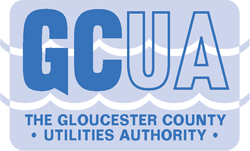What is the function of the Gloucester County Utilities Authority?
The Gloucester County Utilities Authority (also known as the GCUA) collects and treats the sewage discharged every day from residential and non-residential properties in 16 of Gloucester County’s 24 municipalities. The following communities are served by the GCUA: Clayton, Deptford, East Greenwich, Elk, Glassboro, Mantua, Monroe, National Park, Paulsboro, Pitman, Washington, Wenonah, West Deptford, Westville, Woodbury, and Woodbury Heights. These communities run their own local collection piping and machinery, with this local piping connected to the GCUA conveyance system at designated locations throughout the county. This flow travels through 71miles of pipeline to the GCUA facility for treatment. At the plant, this wastewater receives primary and secondary treatment through a biological process which removes more than 95% of the pollutants. The treated effluent is then discharged through a 72-inch diameter pipeline to the Delaware River. The end product of treatment, known as biosolids, is then incinerated on-site by one of GCUA’s two existing incinerators.
The GCUA also accepts certain hauled wastes for disposal at the treatment plant.
The GCUA plays a major role in protecting public health and the environment of Gloucester County while also providing an essential role in supporting existing and attracting new commercial and industrial enterprises to the County.
What day and time are the GCUA Board Meetings Held?
The GCUA Board of Commissioners meet once a month to conduct Authority business. These meetings are held on the second Wednesday at 5:30 p.m. in the GCUA Administration Building located at 2 Paradise Road, West Deptford Township, New Jersey. Occasionally, it becomes necessary to cancel or re-schedule a Board Meeting. Any deviation to the regular meeting schedule will be posted on GCUA’s website.
What are the operating hours for the Septage Receiving Facility?
The operating hours for the septage receiving facility are:
Monday-Friday: 7:00 am – 2:30 pm
How do I report an odor complaint?
If you live in the vicinity of the GCUA treatment plant or any of its offsite facilities and you smell an odor, please call (856) 423-3500, day or night. Leave your name, the time of the call, the vicinity of the complaint, and a return telephone number. GCUA personnel will investigate the location of the complaint and return your call promptly to inform you of any corrective action, if necessary, which will be taken. You can be assured that control of odors is a top priority of the GCUA.
How does the GCUA handle Industrial Polluters?
In 1983, the New Jersey Department of Environmental Protection (NJDEP) approved the GCUA’s Industrial Pretreatment Program. This IPP Program provides for the regulation of non-residential discharges, either directly or indirectly, into the GCUA’s sewer collection system. The GCUA works with businesses in Gloucester County to determine if their discharges have the potential of causing harm to GCUA’s treatment facilities. Businesses who are found to be at risk are issued permits by the GCUA which spell out limits on pollutants in their wastewater. In order to meet the pollutant discharge limits imposed by a GCUA Permit, some businesses are required to treat their wastewater discharge prior to it entering the GCUA collection system. IPP Permittees are required to test their discharges at stated intervals and report the test results. Violators are subject to fines and/or penalties for non-compliance.
A copy of the GCUA’s Industrial Pretreatment Rules and Regulations may be obtained by contacting Joseph Boring, Industrial Pretreatment Manager.
